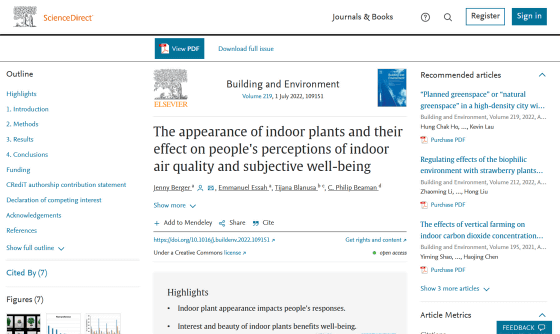What kind of houseplant should I choose to improve mental health?

The World Health Organization (WHO)
The appearance of indoor plants and their effect on people's perceptions of indoor air quality and subjective well-being - ScienceDirect
https://doi.org/10.1016/j.buildenv.2022.109151

Owning houseplants can boost your mental health – here's how to pick the right one
https://theconversation.com/owning-houseplants-can-boost-your-mental-health-heres-how-to-pick-the-right-one-202197
Mental health problems such as depression and anxiety were reportedly responsible for about 22% of absenteeism among workers in the UK in 2021-2022, so even modest attempts to improve mental health are not enough. , can have significant benefits for individual quality of life and the economy.
One of the ways to improve mental health is to ' get in touch with nature ', but it is difficult for modern people who are busy with work and life to reach places rich in nature. Therefore, some people try to improve their mental health by placing foliage plants in their rooms and workplaces to feel the plants as much as possible. In fact, some studies have shown that houseplants reduce stress and lower blood pressure, and some studies show that having houseplants in the workplace increases happiness and productivity.
Happiness and productivity increase just by placing foliage plants in the workplace - GIGAZINE

Even if foliage plants can help improve mental health, there are so many different candidate plants that many people get lost thinking, 'What kind of foliage plants should I choose?' . Therefore, Berger et al.'s research team conducted an online survey of 250 subjects to find out what kind of foliage plants are best for mental health.
Subjects looked at a combination of 12 houseplants and asked which plants they liked and disliked, how they felt about the appearance of each plant, and whether it was associated with well-being and air quality. I answered. Eight species of plants were included in the study: Benjamin rubber tree, sansevieria , cactus , maranta leuconeura , sagebrush , golden pothos , benifklinnenboku and palm , and some were healthy and some were unhealthy. matter. Both are common houseplants found in British homes and offices.

by Jenny Berger
Overall, participants were more likely to rate green, healthy plants as 'happier,' and particularly believed that golden pothos, benjamin tree, and palm were the happiest. I was. Also, these positive evaluations increased as the plants were healthier, and the evaluations were lower for unhealthy plants.
'Our findings show that plants with lush foliage, large leaf areas, and dense canopies are likely to be the most well-being in people,' Berger said. These plants are also believed to have a significant effect on air quality, so consider purchasing easy-to-maintain plants such as Sansevieria,
In addition, past research has shown that curved objects elicit positive emotions in humans, and this study showed that this also applies to the shape of foliage plants. The research team said that plants with round leaves such as Benjamin rubber trees and pothos, and palms with gentle arches at the apex, were evaluated as more beautiful and relaxing by the subjects. On the other hand, plants with sharp pointed leaves, such as cacti and Benifukurinsennenboku, were not liked very much.
Of course, it all depends on your personal preferences and goals as to which plants are best for your room. However, if you want to provide mental health benefits and don't have a desire to grow a particular plant, choosing according to its appearance may be important. “It’s all about aesthetics, fun, beauty, and the health of your plants,” says Berger. Let's go,' he said.

Related Posts:







